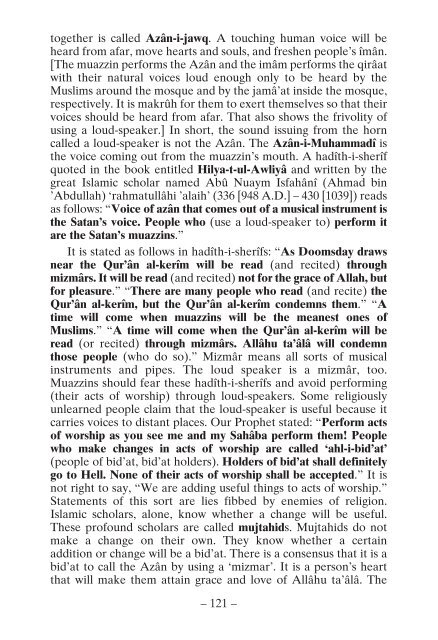Miftah-ul-Janna (Booklet for way to Paradise)
You also want an ePaper? Increase the reach of your titles
YUMPU automatically turns print PDFs into web optimized ePapers that Google loves.
<strong>to</strong>gether is called Azân-i-jawq. A <strong>to</strong>uching human voice will be<br />
heard from afar, move hearts and so<strong>ul</strong>s, and freshen people’s îmân.<br />
[The muazzin per<strong>for</strong>ms the Azân and the imâm per<strong>for</strong>ms the qirâat<br />
with their natural voices loud enough only <strong>to</strong> be heard by the<br />
Muslims around the mosque and by the jamâ’at inside the mosque,<br />
respectively. It is makrûh <strong>for</strong> them <strong>to</strong> exert themselves so that their<br />
voices sho<strong>ul</strong>d be heard from afar. That also shows the frivolity of<br />
using a loud-speaker.] In short, the sound issuing from the horn<br />
called a loud-speaker is not the Azân. The Azân-i-Muhammadî is<br />
the voice coming out from the muazzin’s mouth. A hadîth-i-sherîf<br />
quoted in the book entitled Hilya-t-<strong>ul</strong>-Awliyâ and written by the<br />
great Islamic scholar named Abû Nuaym Isfahânî (Ahmad bin<br />
’Abd<strong>ul</strong>lah) ‘rahmat<strong>ul</strong>lâhi ’alaih’ (336 [948 A.D.] – 430 [1039]) reads<br />
as follows: “Voice of azân that comes out of a musical instrument is<br />
the Satan’s voice. People who (use a loud-speaker <strong>to</strong>) per<strong>for</strong>m it<br />
are the Satan’s muazzins.”<br />
It is stated as follows in hadîth-i-sherîfs: “As Doomsday draws<br />
near the Qur’ân al-kerîm will be read (and recited) through<br />
mizmârs. It will be read (and recited) not <strong>for</strong> the grace of Allah, but<br />
<strong>for</strong> pleasure.” “There are many people who read (and recite) the<br />
Qur’ân al-kerîm, but the Qur’ân al-kerîm condemns them.” “A<br />
time will come when muazzins will be the meanest ones of<br />
Muslims.” “A time will come when the Qur’ân al-kerîm will be<br />
read (or recited) through mizmârs. Allâhu ta’âlâ will condemn<br />
those people (who do so).” Mizmâr means all sorts of musical<br />
instruments and pipes. The loud speaker is a mizmâr, <strong>to</strong>o.<br />
Muazzins sho<strong>ul</strong>d fear these hadîth-i-sherîfs and avoid per<strong>for</strong>ming<br />
(their acts of worship) through loud-speakers. Some religiously<br />
unlearned people claim that the loud-speaker is usef<strong>ul</strong> because it<br />
carries voices <strong>to</strong> distant places. Our Prophet stated: “Per<strong>for</strong>m acts<br />
of worship as you see me and my Sahâba per<strong>for</strong>m them! People<br />
who make changes in acts of worship are called ‘ahl-i-bid’at’<br />
(people of bid’at, bid’at holders). Holders of bid’at shall definitely<br />
go <strong>to</strong> Hell. None of their acts of worship shall be accepted.” It is<br />
not right <strong>to</strong> say, “We are adding usef<strong>ul</strong> things <strong>to</strong> acts of worship.”<br />
Statements of this sort are lies fibbed by enemies of religion.<br />
Islamic scholars, alone, know whether a change will be usef<strong>ul</strong>.<br />
These profound scholars are called mujtahids. Mujtahids do not<br />
make a change on their own. They know whether a certain<br />
addition or change will be a bid’at. There is a consensus that it is a<br />
bid’at <strong>to</strong> call the Azân by using a ‘mizmar’. It is a person’s heart<br />
that will make them attain grace and love of Allâhu ta’âlâ. The<br />
– 121 –

















